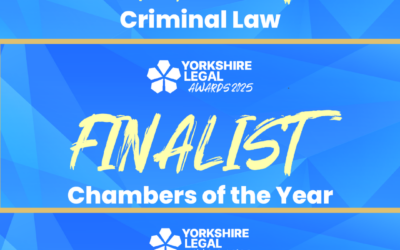Public Law Update: April 2021
Index of Cases
- Re YY (Children: Conduct of the Local Authority) [2021] EWHC 749 (Fam) – The Court of Appeal considers the serious failings of a Local Authority – https://www.bailii.org/ew/cases/EWHC/Fam/2021/749.html
- Re P (A Child) (Interim Separation) [2021] EWCA Civ 499 – The Court of Appeal considered a local authority’s appeal following the refusal to remove a baby from his mother after the breakdown of a residential placement pending final hearing – https://www.bailii.org/ew/cases/EWCA/Civ/2021/499.html
- Re F (Assessment of birth family) [2021] EWFC 31 – Application by a LA pursuant to Part 18 FPR 2010 to determine whether “original family” of the mother, who was adopted, should be assessed as a kinship carer for F, mother’s baby https://www.bailii.org/ew/cases/EWFC/HCJ/2021/31.html
- Re YY (Children: Conduct of the Local Authority) [2021] EWHC 749 (Fam)
Judgment of Mr Justice Keehan.
The High Court delivered judgment following a fact finding hearing on three applications – contact with children in care, discharge of care orders with the making of SGOs to long-term foster carers and permission to change the children’s surnames. The Court found “egregious and long-standing failures” by the local authority and questioned whether their Children’s Services were fit for purpose. The judgment sets out a series of failings by the LA in the discharge of their statutory duties.
Background: The case concerned three children: A (17 years), B (13 years) and D (11 years). C, their sister, tragically died in June 2019 when she was only 14 years old. The mother of all the children is M. F did not play a role in the proceedings.
The children were placed with LA foster carers (FC) on 24 July 2012. They moved to alternate foster carers on 15 September 2012, where they remained until the date of this hearing. All four children were made subject of Care Orders on 27 January 2014.
Early in their placement with the FCs, the children made serious sexual allegations against their M, their F and against wider family members. A fact find hearing took place in 2013 before HHJ Rundell, DFJ in Hereford and Worcester. In his judgment, he did not find the children’s allegations established, but he did find they had been exposed to sexual activity when they had been living with their parents. The children remained resolute in their allegations, supported by their FC.
Following the original proceedings, the SW approached her Head of Service, on the advice of the IRO, to discuss whether the children could be informally known as the FCs surnames – ‘XX’. There was no professionally-led life story work taking place and contact was not happening. The SW agreed with the children that she would not tell them when indirect contact (letters and cards) arrived for them. They would be asked twice a year whether they had changed their minds about reading them.
The children were referred to Camhs in January 2014, the work did not commence until April 2015. The work was undertaken on the basis that there had been anal abuse – the LA did not act to correct this narrative.
In May 2015, MGM lodged an application for contact pursuant to s34(3). The Court considered the application, alongside the LA’s application to change the children’s surnames. On 22 September 2015, HHJ Rundell adjourned the hearing until June 2016 to allow for the Camhs work to be completed. In June 2016, the matter was adjourned again (until July 2016) and a further report directed by Dr Asen, psychologist. Dr Asen raised concerns that the FCs had not received a copy of the FFH judgment, had only been told negatives re the parents and were not equipped by the LA to provide positives about their birth family.
On 6 October 2016, the Court directed the FCs receive a copy of the FFH judgment. Dr Asen recommended concentrating on re-establishing contact with the MGM, with a piece of preparatory work to be undertaken with the children.
In January 2017, a new SW was allocated. She started work with the Children and the FCs. At a hearing on 28 April 2017 the LA provided a detailed plan for contact, therapy and life story work.
In July 2017, the LA made another application for the change of the children’s surnames to XX. In the September 2017 updated care plans, a plan pf permanence by SGO was recommended.
In May 2018, SW Hannah Ellis completed a Child and Family Assessment. It documented the children’s wish to be adopted by the FCs. An SGO Report was commissioned.
In February 2019, Child C became very unwell, suffering headaches and high temperatures. She experienced symptoms throughout March and April 2019. On 28 April 2019 she deteriorated, suffering spasms and involuntary muscle tics. She was taken to A&E by the FCs. She was referred to the Trust’s counselling service.
On 2 May 2019, C was admitted to hospital again but discharged the following day. On 3 May 2019 she was urgently referred to Camhs. On 14 May 2019 C was diagnosed with anxiety and PANDAS (Pediatric Autoimmune Neuropsychiatric Disorder Associated Streptococcal Infection).
On 26 May 2019, C was admitted to hospital again. She was referred to Birmingham and was suffering severe sepsis. She was placed in an induced coma and permission given by the LA to remove her aortic valve. The operation took place on 28 May 2019.
By 3 June 2019, there had been no real change in C’s condition. She remained in an induced coma. On 6 June 2019 the LA sought permission to remove life support.
On 19 July 2019, M wrote to the LA to set out her opposition to the SGO. On 27 September 2019, M made an application for contact pursuant to s34(3).
On 11 October 2019, the SGO assessment (Kathryn Straughan) was completed. It recommended that the SGO should not be made and the Care Orders should not be discharged. Head of service emailed the SW to ask her to ‘revisit’ her recommendation. The SW resigned her position.
On 16th October 2019, the FCs were reapproved by the LA fostering panel. On 8 November 2019, the LA applied to discharged the Care Orders and made an application to change the children’s surnames.
Three applications came before this court:
- M’s application to spend time with the children,
- LA’s application to discharge the Care Orders, on the basis that SGOs in favour of the FC should be made, and
- The LA’s application to change the children’s surnames to those of the FC.
M sought findings of fact in respect of the alleged actions and failings of the LA and the FCs.
Child A and B sought findings in respect of the alleged actions and failings of the LA.
On 8 January 2020, the FCs were joined as intervenors to the proceedings.
Following the FFH, the Court set out the “egregious and long-standing failures” of the LA.
- There was no dispute about the appropriateness of the withdrawal of life support for Child C. This issue was the process. The local authority had at the time no policy in place on the issue as recommended by the Court of Appeal inRe C.
- The judge also found that senior managers expected the social worker (who had previously advised against an SGO) to write an assessment recommending an SGO be made to the foster carers despite the fact that it was not what she professionally recommended, and the report was then approved and filed in support the making of an order by the court.
- The judge was critical of the way that the local authority ignored the advice of an expert appointed within the proceedings and the recommendations and concerns of the DFJ who accepted the views of the expert. He describes the local authority approach as “disgraceful” and “very shocking”. He makes it clear that in its care planning and discharge of its duties towards children and families that there is an expectation that an authority should respond positively to such advice from an expert and a senior circuit judge. Keehan J says the approach of the local authority revealed“a mindset which has ultimately caused them considerable, possibly irreparable, emotional and psychological harm” [189].
- The judge criticised the fact that the local authority failed to provide proper disclosure of relevant records before the hearing began. 2000 pages were disclosed once the hearing started.
The Judge concluded that “The children have been utterly failed by this local authority” and that the local authority wrongly excluded the mother from decision making, in particular in relation to Child C.
It was agreed that the SGO would not be made and that the application for a care order would be withdrawn, that consideration of direct contact would be adjourned while a psychologist would be instructed to assess and work with the children, mother and the foster carers (who had acknowledged their own failings). The mother consented to the change of surnames for the children to that of the foster carer, and the court made the order thereby remedying a breach of the duty under s33(7) Children Act 1989.
https://www.bailii.org/ew/cases/EWHC/Fam/2021/749.html
- Re P (A Child) (Interim Separation) [2021] EWCA Civ 499
Judgment of Lord Justice Edis and Lord Justice Jackson.
The Court of Appeal considered a local authority’s appeal following the refusal to remove a baby from his mother following the breakdown of a residential placement pending final hearing.
Background: Baby, P, was born in August 2020. Within a week of his birth, P was made subject of an interim care order and was placed in a mother and baby foster placement with his mother. The placement broke down and the court approved the placement of P into local authority foster care. A short time later, in October 2020, P and his mother were reunited in a second residential assessment placement. The mother’s initial positive progress was not maintained and the PAMs assessment concluded that P could not safely return into the community with his mother.
In March 2021, mother’s new partner was permitted to join P and mother in the residential unit in order to assess whether he could compensate for the apparent deficits identified in mother’s care and whether they could prioritise P’s needs over their own.
Matters became so concerning that P was removed from mother’s care overnight on two occasions. The unit served notice of their intention to terminate the placement following the mother assaulting her partner and attempting to self harm. The LA sought urgent permission to remove P from mother’s care, supported by the IRO and the CG.
The matter came before HHJ Greensmith, who refused the application and directed the LA to file a position statement, setting out the support that could be offered to prevent separation at this stage. The matter returned the following day for submissions. HHJ Greensmith did not approve the plan of removal on the basis that there was insufficient evidence to inform a decision regarding whether separation was necessary.
The LA applied for permission to appeal the decision of HHJ Greensmith. Permission was granted but, in the meantime, the court (different tribunal) determined that P should be placed in foster care. By the time of the appeal, the mother had spent supervised time with P on all but one day.
The mother did not oppose the appeal. Edis LJ concluded that there was no proper basis for the court to doubt the five-month professional assessment at the residential unit, and there should be no pressure for that placement to continue. Other theoretical placements were either impossible, inappropriate or could not be put in place immediately. Therefore, the LA’s plan for separation could continue until a full hearing could take place. P remained in foster care and had frequent contact with his mother.
https://www.bailii.org/ew/cases/EWCA/Civ/2021/499.html
- Re F (Assessment of birth family) [2021] EWFC 31
Judgment of The Honorable Mr Justice Cobb.
An application by a local authority pursuant to Part 18 FPR 2010 to determine whether the “original family” of F, who had been adopted as a child, should be assessed as a kinship carer for F’s children. On the facts of this case, the Court determined the LA had no obligation to assess but cautioned against this being read as a determination of wider application.
Background: The mother had been adopted during her own childhood at age 6 years. By the3 age of 13, her placement had started to break down and she made successful communication with her birth family. At one point during her childhood, she went to stay with them for a month.
At age 17, mother had been placed into foster care and discovered that she was pregnant. Mother’s view was that her birth family had been wholly negative about her pregnancy. She did not want them to be assessed as potential kinship carers for her child (F).
The LA’s plan was for F to be rehabilitated into the care of M, but that there should be parallel planning to include consideration of an assessment of the birth family.
The Honorable Mt Justice Cobb considered the cases of Re A, B, C (adoption: notification of fathers and relatives) [2020] EWCA Civ 41 and Re H (care and adoption assessment of wider family) [2019] EWFC 10. On careful consideration of the legal principles, the Court was satisfied that the mother’s birth family were not her current ‘family’ or her ‘relatives’ in the context of CA 1989 Part III.
The Court determined that, even if the birth family could bring themselves within the definition of ‘family’ there was evidence that argued against them being considered as a realistic option to care for F. Mother’s opposition also carried significant weight.
The Court noted that there may be circumstances in which a birth family could fall to be properly assessed, but that was not the case in this instance.
https://www.bailii.org/ew/cases/EWFC/HCJ/2021/31.html



